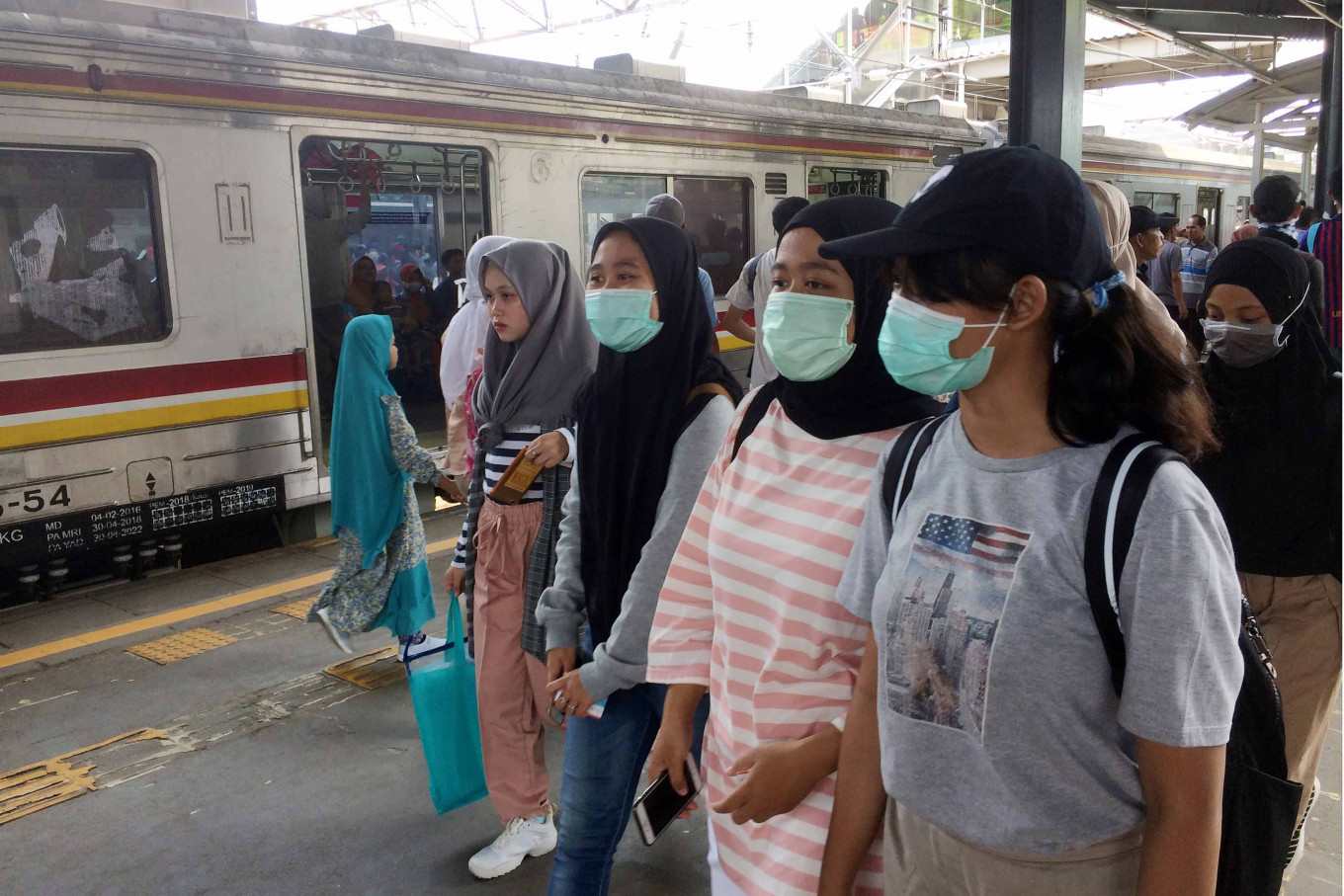Popular Reads
Top Results
Can't find what you're looking for?
View all search resultsPopular Reads
Top Results
Can't find what you're looking for?
View all search resultsHouse joins experts to push for lockdown against COVID-19
Government and lawmakers have joined experts in calling for the government to take extreme measures to contain the spread of the outbreak in Indonesia, warning that failing to do so could turn the country into "the new epicenter" of the COVID-19 pandemic.
Change text size
Gift Premium Articles
to Anyone
C
alls are mounting for President Joko “Jokowi” Widodo to take extreme measures to stop the spread of the novel coronavirus, including implementing a localized quarantine or partial lockdown, despite concerns over executing such a measure.
House of Representatives Speaker Puan Maharani, as well as both government and opposition lawmakers, have demanded the Jokowi administration enforce stricter measures by implementing a localized quarantine as stipulated in the 2018 Health Quarantine Law, saying that many people were ignoring the President’s call to practice social distancing.
“The House of Representatives supports [taking] the measure to mitigate [the spread of] the COVID-19 pandemic by implementing social distancing and localized quarantine policies as stipulated under the 2018 law on health quarantine,” Puan said in a statement on Monday.
“The House is calling on the government and the people to be disciplined in practicing social distancing,” she added.
The central government has sent mixed messages as regards its COVID-19 prevention and control measures, with the President seemingly engaged in a policy spat with regional administrations on how best to limit the spread of the SARS-CoV-2 virus and COVID-19, the disease it causes.
Some regional administrations, including Jakarta, have called for a policy resembling a lockdown, but the President has said that the regions had no jurisdiction to issue such a measure. Meanwhile, the central government has been undecided on whether it would resort to imposing a lockdown.
The country's scientists have also suggested a lockdown for areas been deemed "hot zones" to contain the virus' spread ahead of the Ramadan fasting month in April and the Idul Fitri Islamic holiday in May.
Indonesia has reported 227 confirmed cases of COVID-19 to date.
Public health specialist Nurul Nadia Luntungan of the Center for Indonesia's Strategic Development Initiatives (CISDI) called for the government to be "assertive" in imposing its social distancing policy, rather than issuing a mere appeal as it had. She stressed that strict social distancing was needed to minimize deaths, and added that people with moderate to severe symptoms of the disease could be treated at hospitals.
Nurul also noted that Indonesia's lackluster approach to COVID-19 testing raised the possibility of cases going undetected, particularly asymptomatic cases that could then unknowingly transmit the virus to others without a strict protocol to restrict public interaction. This could overwhelm healthcare facilities in the country, which were unprepared to manage the outbreak.
Epidemiologist and biostatistician Pandu Riono at the University of Indonesia concurred, saying that aggressive social distancing measures should be implemented to slow the spread of COVID-19 and minimize possible transmission to high-risk populations. Slowing the rate of infection, or "flattening the curve", would in turn prevent overburdening the country's limited healthcare facilities and workers.
However, the government must first establish interinstitutional coordination and secure the supply and distribution of basic goods before imposing such measures to ensure their effectiveness, he said.
"The government lacks command. They are confused [...] despite the existence of guidelines they can follow and lessons from other countries," Pandu told The Jakarta Post on Tuesday.
Pandu also believed that community transmission had been occurring in Indonesia since January, and that cases remained largely undetected due to lack of testing.
Deputy chairman Mulfachri Harahap of House Commission III, which oversees legal affairs, suggested that the government seriously consider imposing a lockdown, pointing to China's success in bringing the local epidemic under control after imposing a nationwide lockdown.
"I appreciate the efforts of the government’s rapid response team in containing the virus, but I'm also waiting for the policies,” said the National Mandate Party (PAN) politician.
Former president Susilo Bambang Yudhoyono also called on the Jokowi administration to take a more serious approach to the coronavirus by adjusting existing policies, noting that the government appeared to have underestimated the virus.
The Democratic Party patron expressed concern that Indonesia would see an explosion in the number of cases when other countries were seeing declines in infection, and that the government's belated response could turn Indonesia into "the new epicenter" of the pandemic.
With the number of new cases in China dropping daily to near zero in recent weeks, the epicenter of the pandemic had now shifted to Europe.
Yudhoyono also noted that several countries and cities had imposed lockdowns to save lives, and that in such areas, people were prohibited from leaving their homes and places that could host large crowds, like restaurants and malls, had been closed.
“Some people may be uncomfortable about this policy, which also carries risks, including economic losses, but such policies and actions [are necessary]. Public health and safety should be prioritized above all else,” he emphasized.
Fadholi, a NasDem Party lawmaker of the ruling coalition who is also on the House's public health commission, also called on the government to impose a lockdown.
"Some countries are responding quickly to the pandemic by imposing a lockdown. The government should study [how to implement the policy] from this point forth," he insisted.










